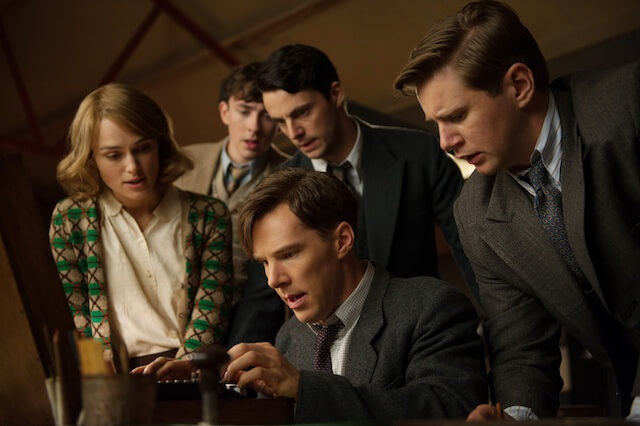‘The Imitation Game’ Let’s take a probably not wild guess and assume that the moment English mathematician Alan Turing cracked the Nazis’ Enigma code — thus setting the path for both the winning of World War II and the creation of the computer — it didn’t happen in a pub as a “Eureka!” moment, followed by him running out of the bar like a madman, pursued by his perplexed colleagues. It’s an admittedly entertaining moment in “The Imitation Game,” but also a silly one — the kind of biopic scene that subtracts credibility from the whole but charms anyway. You know it probably didn’t happen that way or any way like it — mathematical discoveries are much more slow burn and boring — but the moment captures an anxious glee that, at the time, trumps dull truth. There’s not enough of these dumb-fun bits in “The Imitation Game.” Usually it’s just a despairingly unimaginative, pitched-to-the-rafters, embarrassingly simplified take on a deeply, comically complex story. Based on Andrew Hodges’ doorstop “Alan Turing: The Enigma,” the film whittles it down to the bare essentials — or rather, one of the least interesting angles one could take. It’s a dumb movie about smart people. Played in full-on alien mode by Benedict Cumberbatch, Turing is here a strident, borderline Asperger’s loner who has to learn the value of teamwork. His fellow Enigma crackers don’t like him, in part because he asked for them to be fired. He has to learn the necessity of worming his way into their hearts, and perhaps ours as well? “The Imitation Game” doesn’t embarrass itself by trying to explain convoluted mathematical issues; there’s nothing on the order of “A Beautiful Mind”’s forehead-slapping breakdown of game theory. It knows it can’t explain code-breaking, so it doesn’t try. Instead, it sticks to scenes of Turing sweating over a machine or battling his military overlords, who complain that doing the impossible is taking a long time. It doesn’t avoid complexity, but it doesn’t make a meal out of it either. The most troubling part of the story is how they were forced to use their knowledge once the code was cracked without letting the Nazis know they know their secrets, meaning they had to knowingly let many people die. This touches on a moral enigma, then gets out of there as quickly as it can, as though lip service was all that was required. The film has a bigger axe to grind than humanizing Turing, and it’s pushed off until the final reel. That would be its hero’s semi-secret homosexuality. There’s some pointed talk in the dialogue about pretending to be something you aren’t, plus a gruesomely repeated aphorism about great deeds being done by those one least expects. But it’s as afraid to deal with Turing’s secret as he was to let it be known, and the shoehorning of it to the very end — minus some wink-wink business with his beard fiancee, played by a gamely nerdish Keira Knightley — smacks of the bad old days. Cumberbatch at least is appropriately and predictably pissy — a rock star playing a rock star who doesn’t care if you like him so much as you worship him. Turing didn’t get the film he deserved, but he did get the perfect actor. Follow Matt Prigge on Twitter @mattprigge
Director: Morten Tyldum
Stars: Benedict Cumberbatch, Keira Knightley
Rating: PG-13
2 (out of 5) Globes
Review: ‘The Imitation Game’ gives Alan Turing a dumb biopic

The Weinstein Company


















